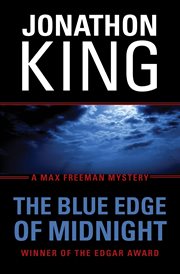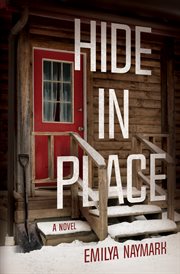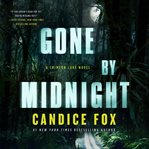CHAPTER 1 I was a mile upriver, my feet planted on the stained concrete dam, back bent to the task of yanking my canoe over the abutment. It was past midnight and a three-quarter moon hung in the South Florida sky. In the spillover behind me, tea-colored water from the falls burbled and swirled, roiling up against itself and then spinning off in curls and spirals until going flat and black again downstream. Ahead I could see the outlines of thick tree limbs and dripping vine and the slow curve of water bending around a corner before it disappeared into darkness. When I moved onto this river more than a year ago, my city eyes were nearly useless. My night vision had always been aided by street lamps, storefront displays, and headlights that swept the streets, crosshatching each other to create a web of light at every intersection. I'd spent my life on the Philadelphia streets, watching, gauging the hard flat shadows, interpreting the light from a door left ajar, waiting for a streak from a flashlight, anticipating the flare of a match strike. Out here, fifteen miles inland from the Atlantic Ocean in a swamped lowland forest, it took me a month to train my eyes to navigate in the night's natural light. Tonight, in moonlight, the river was lit up like an avenue. When I got the canoe floated in the upstream pool, I braced myself with both hands on the rails at either side, balanced my right foot in the middle, steadied myself in a three-point stance, and pushed off onto quiet water. I settled into the stern seat and pulled six or seven strokes to get upstream from the falls and then readied myself. The mile from my stilted shack had just been a warm-up. Now I'd get into the heavy work that had become my nightly ritual. This time of year in South Florida, high summer when the afternoon rains came like a rhythm, this ancient river to the Everglades spread its banks into the cypress and sabal palms and flooded the sawgrass and pond apple trees until the place looked more like a drowning forest than a tributary. It was also the time of year when a man with a head full of sour memories could power a canoe up the river's middle and muscle and sweat through yet another impossible night. I tucked my right foot under the seat, propped my left forward against a rib, and was just pulling my first serious strokes when my eyes picked up a glow ahead in the root tangle of a big cypress. Trash, I thought, pulling two strokes hard in that direction. Even out here you ran into civilization's callousness. But the package seemed too tight as I glided closer. Canvas, I could tell now from the cream-color of the cloth. I took one more stroke and drifted up to what now appeared to be a bundle the size of a small duffel bag. The package was wedged softly into a crook of moss-covered root by the current. I reached out and prodded it with my paddle, loosening the hidden end from the shadows. When it finally slid out onto free water, moonlight caught it and settled on the calm, dead face of a child. Air from deep in my throat held and then broke like a bubble in my mouth and I heard my own words come out in a whisper: "Sweet Jesus. Not again." *** For a dozen years I'd been a cop in Philadelphia. I got in at the smooth-faced age of nineteen without my father's blessing. He was a cop. He didn't want me to follow. I went against his wishes, which had become a habit by then, and got through the academy the same way I'd gotten through school. I rode the system, did just enough to satisfy, didn't stand out, but tried always to stand up. My mother, bless her soul, called it a sin. "Talent," she said, "is God's gift to you. What you do with it, is your gift back to him." According to her, my talent was brains. My sin was using only half of them. Police work came easy to me. At six feet three inches tall, and a little over two hundred pounds, I'd played some undistinguished football in high school and my friend Frankie O'Hara used to drag me into his father's South Philly gym once in a while to act as a stand-in sparring partner. My strength there was that I didn't mind getting hit. A shot in the face never bothered me much. How that trait worked with my other "talent," my mother could never explain. But the combination of a cloaked intelligence, some size, and an indifference to a crack on the nose made police work easy for me. In my years on the force I'd climbed a bit of a ladder, taken some special assignments, worked for a short time in the detective bureau. I'd passed the sergeant's exam a couple of times. But misunderstandings with management and "Officer Freeman's seeming total lack of ambition" found me walking a downtown beat on the four-to-twelve shift. It was fine with me until the night I shot a child in the back. *** It was near the end of my shift. I was standing out of a cold drizzle at Murphy's Newsstand, a little step-in shop next to a deli just off Broad Street. Murph peddled the daily newspapers, three shelves of magazines holding the monthly array of faked-up cleavage, and probably the most important item of his business, the daily racing forms. With some thirty years on the street, Murph was the most sour and skeptical human being I'd ever met. He was a huge lump of a man who sat for hours at a time on a four-legged stool with what seemed like half of his weight dripping over the sides of the small circular cushion. He had a fat face that folded in on itself like a two-week-old Halloween pumpkin and you couldn't tell the color of his small slit eyes. He was never without a cigar planted in the corner of his mouth. "Max, you're a fuckin' idiot you stay on a job what wit da way they been stickin' it to ya," was his standard conversation with me every night for two years. He had a voice like gravel shuffling around in the bottom of a cardboard box. And he called everyone from the mayor to his own mother a "fuckin' idiot," so you didn't take it personally. On that night he was grumbling over the day's results from Garden State Raceway when my radio started crackling with a report of a silent alarm at C&M's Stop and Shop on Thirteenth Street, just around the corner. I reached down to turn up the volume and Murph rolled the cigar with his tongue and that's when we heard the snap of small caliber gunfire in the distance. The old vendor looked straight into my face and for the first time in two years I could see that his eyes were a pale, clear blue. "Casamir," he croaked as I started out the open door, my hand already going to the holster strap on my 9mm. It doesn't take long for adrenaline to flush into your blood when you hear gunshots. As a cop in the city I had heard too many. And each time I had to fight the immediate urge to turn and walk the other way. I was halfway to the corner and my normally slow heartbeat was banging in my chest. I was trying to set up a scene in my head of Casamir's place; second storefront around the corner, glass doors flush against the wall, dingy fluorescent lighting inside, Casamir with his too-big smile and that pissy little taped-handled .25 behind the counter. I wasn't thinking about the rain-slick sidewalk or the lack of decent cover when I made the corner and tried to plant my foot and went skidding out in full view of some kid's gun barrel. Snap. I heard the crack of his pistol but barely registered the sharp smack against my neck and I came up on one knee, brought up the 9mm and saw the kid standing thirty feet away, a black hole of a gun barrel as his only eye. I was staring into that hole when I picked up the movement of something coming out of Casamir's door and then Snap, another round went off. I hesitated for one bad instant, and then pulled the trigger. My weapon jumped. My eyes instinctively blinked. Chaos competed for only a second. And then the street went quiet. The first kid went down without so much as a whimper. Casamir's .25 had sounded the third report of the night and caught the shooter in the street flush in the temple. My round hit the second boy, the one who had jumped out the door just as I hesitated. The 9mm slug caught him in the back between his skinny shoulder blades and he dropped. Unlike the Hollywood version, the kid didn't get blown back from the impact. He didn't get spun around. He didn't slowly crumple to his knees or try to reach out and call someone's name. He just melted. The noise of my own gun was ringing in my ears and I must have been getting up because the angle of the scene was changing, but I didn't know how my knees were working. Casamir was standing over the bodies by the time I made it thirty feet. He looked up at me, the old .25 hanging from his hand. "Max?" he said, confused at my presence. His face was blank. His smile was gone. Maybe forever. The first boy was facedown, the pistol that he had fired, first at Casamir and then at me, had clattered off into the gutter. The younger boy, mine, lay oddly twisted, his clothes, all baggy and black, seemed comically empty. But his face was turned up, his open eyes gone cloudy through long, childlike lashes. He couldn't have been more than twelve. I was staring into that face when Murph, trailing from the newsstand, stepped up to my side and looked at me and then down at the kid. "Fuckin' idiot," he says. But I wasn't sure which one of us he was talking about. I was still staring into the boy's face, trying to breathe through a liquid burbling in my throat and then I heard Casamir repeating my name: "Max? Max?" And I looked up and he was staring at me and pointing to his neck and saying, "Max. You are shot." And suddenly that night, and that world, went softly black. -Reprinted from The Blue Edge of Midnight by Jonathon King by permission of Dutton, a member of Penguin Putnam Inc. Copyright (c) 2002. All rights reserved. This excerpt, or any parts thereof, may not be reproduced in any form without permission. Excerpted from The Blue Edge of Midnight by Jonathon King All rights reserved by the original copyright owners. Excerpts are provided for display purposes only and may not be reproduced, reprinted or distributed without the written permission of the publisher.



